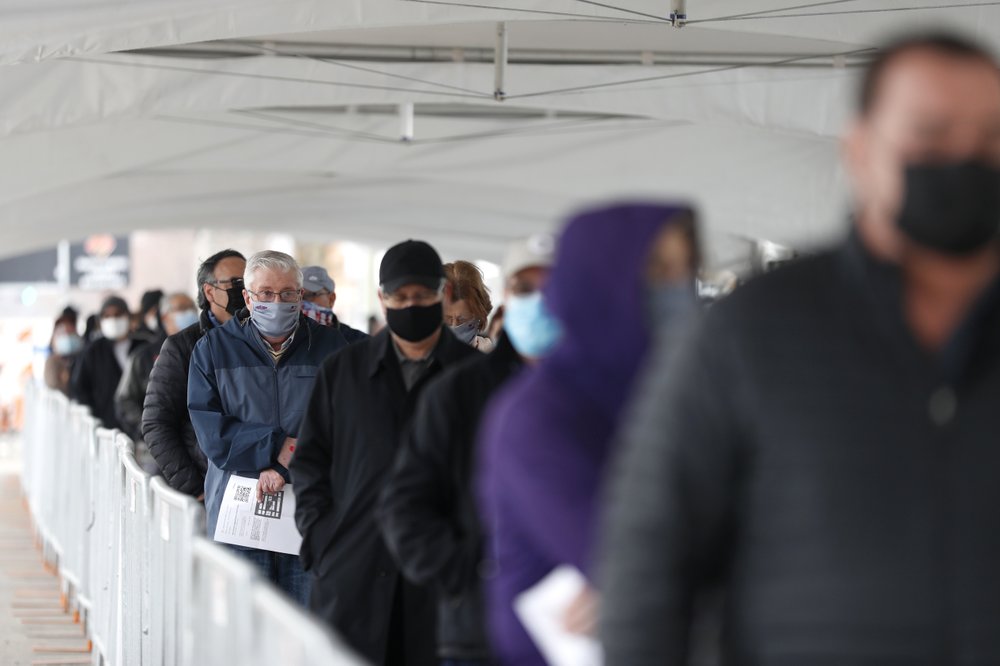Some Pandemic Adjustments Could Be Permanent

FILE - In this March 10, 2021, file photo, people wait in line at the check-in area to enter the United Center mass COVID-19 vaccination site in Chicago. U.S. deaths from COVID-19 are falling again as the nation recovers from the devastating winter surge. Most forecasts predict coronavirus deaths will fall further in coming weeks, as more people are vaccinated. (AP Photo/Shafkat Anowar, File)
Everyone had to make adjustments following the start of the COVID-19 pandemic.
Like it or not, some of those adjustments might be permanent — though some might be for the better.
One of the changes made is the switch to telehealth where people can speak to their family physician or doctors online instead of in-person. Dr. Elizabeth Kidder, The Chautauqua Center medical provider, said telehealth will be a permanent change to health care and medical culture, which is a direct result of the pandemic.
“The medical community figured out the telehealth situation early on and that was great. It was a nice change and a viable change,” she said.
Dr. Michael Faulk, Chautauqua County physician, said telemedicine by primary care specialists has increases significantly during the pandemic.
“For those who might have transportation issues, telemedicine has been viewed as a significant win,” he said. “Obviously, for the safety of all, physician offices were encouraging and often times were requiring telehealth for routine visits where essential care could be provided safely and efficiently. As COVID infections decrease and we move toward more of our population getting vaccinated, we are seeing more and more patients having the option of in-person evaluations. The footprint of telemedicine will continue to grow and is one of the changes in health care resulting from the pandemic that we will see grow well into the future.”
Dr. Robert Berke, Chautauqua County physician, said telemedicine is a benefit for the patient who no longer has to travel and then sit and wait in a waiting room to be called for their appointment .
“Sometimes (a patient) blows a couple hours sometimes traveling and waiting. When the appointment is done at home, they’re at ease,” he said. “Now that it’s all virtual it’s efficient. Obviously with the pandemic, we’ve used it extensively.”
Despite the increase in the use of telehealth, all three doctors said in-person appointments are still important.
“There is great value to seeing people in-person,” Kidder said. “Actually doing a physical examination is paramount to what we do. In no means will telehealth replace in-office visits, but it certainly is an addition to how we practice medicine going forward.”
Faulk said because COVID-19 impacted people with underlying health conditions like diabetes, obesity and hypertension more than healthier people who aren’t elderly, that people will show more interest in prevention of medical problems and there will be a broader focus on overall wellness.
“(We) recognizing how our current lifestyle choices are fueling an epidemic of obesity, diabetes, heart disease and overall poor metabolic health. This has not been discussed much throughout the pandemic,” he said. “Many of these comorbid conditions are preventable with the correct diet and regular exercise, however, the average individual may not have the resources to understand what these important concepts are all about nor the understanding of how improving metabolic health results in overall improved immune function and increased resiliency against infections like COVID.”
Kidder and Berke said the pandemic might change how people view health care permanently when it comes to respiratory viruses.
“I think the American public’s understanding of respiratory viruses has come a long way. It’s amazing that this year’s flu season is remarkably low because people are doing the precautions of wearing a mask and good hand hygiene,” Kidder said. “We might see changes in behavior of how a respiratory virus is spread and some of the measures that might stop that. We might see people wearing masks to prevent flu spread.”




